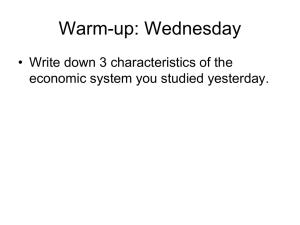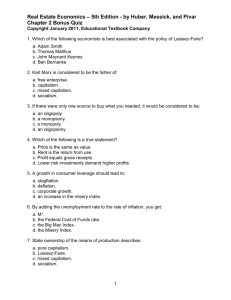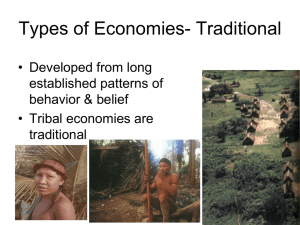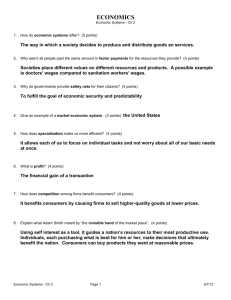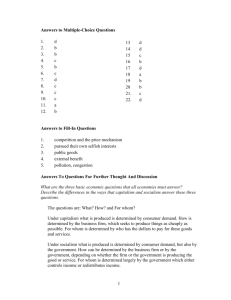Maria Mies
advertisement
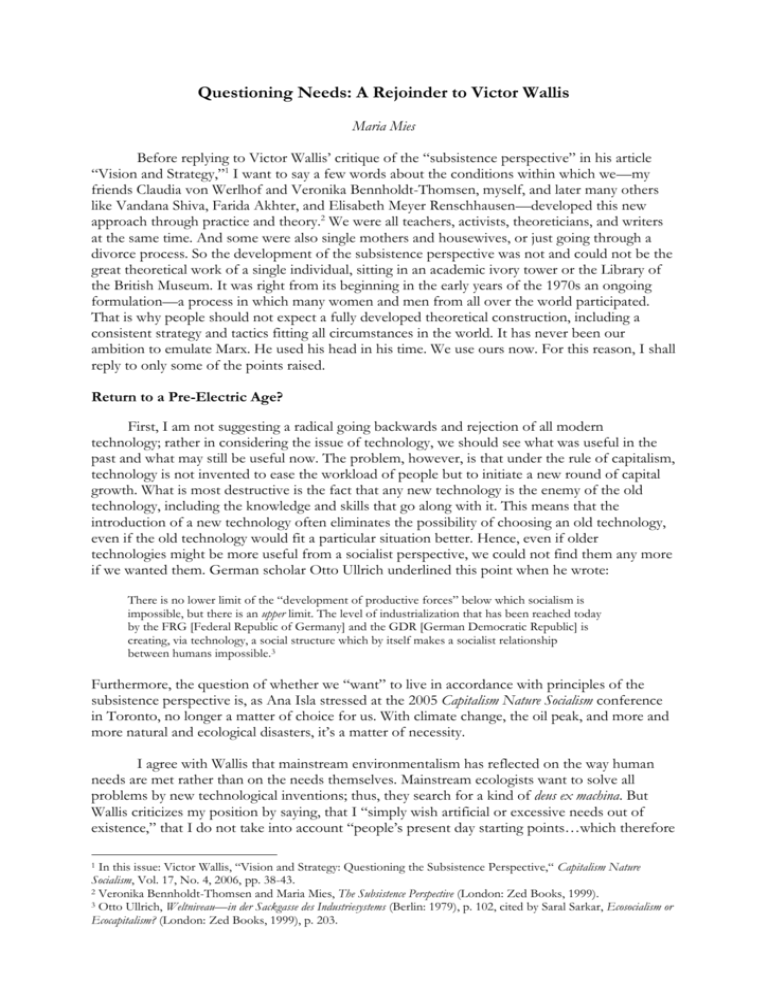
Questioning Needs: A Rejoinder to Victor Wallis Maria Mies Before replying to Victor Wallis’ critique of the “subsistence perspective” in his article “Vision and Strategy,”1 I want to say a few words about the conditions within which we—my friends Claudia von Werlhof and Veronika Bennholdt-Thomsen, myself, and later many others like Vandana Shiva, Farida Akhter, and Elisabeth Meyer Renschhausen—developed this new approach through practice and theory.2 We were all teachers, activists, theoreticians, and writers at the same time. And some were also single mothers and housewives, or just going through a divorce process. So the development of the subsistence perspective was not and could not be the great theoretical work of a single individual, sitting in an academic ivory tower or the Library of the British Museum. It was right from its beginning in the early years of the 1970s an ongoing formulation—a process in which many women and men from all over the world participated. That is why people should not expect a fully developed theoretical construction, including a consistent strategy and tactics fitting all circumstances in the world. It has never been our ambition to emulate Marx. He used his head in his time. We use ours now. For this reason, I shall reply to only some of the points raised. Return to a Pre-Electric Age? First, I am not suggesting a radical going backwards and rejection of all modern technology; rather in considering the issue of technology, we should see what was useful in the past and what may still be useful now. The problem, however, is that under the rule of capitalism, technology is not invented to ease the workload of people but to initiate a new round of capital growth. What is most destructive is the fact that any new technology is the enemy of the old technology, including the knowledge and skills that go along with it. This means that the introduction of a new technology often eliminates the possibility of choosing an old technology, even if the old technology would fit a particular situation better. Hence, even if older technologies might be more useful from a socialist perspective, we could not find them any more if we wanted them. German scholar Otto Ullrich underlined this point when he wrote: There is no lower limit of the “development of productive forces” below which socialism is impossible, but there is an upper limit. The level of industrialization that has been reached today by the FRG [Federal Republic of Germany] and the GDR [German Democratic Republic] is creating, via technology, a social structure which by itself makes a socialist relationship between humans impossible.3 Furthermore, the question of whether we “want” to live in accordance with principles of the subsistence perspective is, as Ana Isla stressed at the 2005 Capitalism Nature Socialism conference in Toronto, no longer a matter of choice for us. With climate change, the oil peak, and more and more natural and ecological disasters, it’s a matter of necessity. I agree with Wallis that mainstream environmentalism has reflected on the way human needs are met rather than on the needs themselves. Mainstream ecologists want to solve all problems by new technological inventions; thus, they search for a kind of deus ex machina. But Wallis criticizes my position by saying, that I “simply wish artificial or excessive needs out of existence,” that I do not take into account “people’s present day starting points…which therefore In this issue: Victor Wallis, “Vision and Strategy: Questioning the Subsistence Perspective,“ Capitalism Nature Socialism, Vol. 17, No. 4, 2006, pp. 38-43. 2 Veronika Bennholdt-Thomsen and Maria Mies, The Subsistence Perspective (London: Zed Books, 1999). 3 Otto Ullrich, Weltniveau—in der Sackgasse des Industriesystems (Berlin: 1979), p. 102, cited by Saral Sarkar, Ecosocialism or Ecocapitalism? (London: Zed Books, 1999), p. 203. 1 2 cannot lead towards a realizable political strategy.” And he continues: “The process of redefining needs that are experienced at the personal level cannot be the same for everyone…” Here I disagree strongly. I follow the Chilean economist Manfred Max-Neef in his definition of needs.4 He says that the basic needs are the same for everyone in both poor and rich countries and poor and rich classes. And these basic needs are limited. They include the need for food and drink, shelter, clothing, etc., which he calls subsistence needs. But there are also needs for affection, love, respect, learning, fantasy, adventure, company, friendship, enjoyment, pleasure, and work. All these needs are universal, and these latter needs I also include as subsistence needs. Most importantly, Max-Neef distinguishes between needs and satisfiers. Whereas needs as such cannot be increased, satisfiers can. And capitalism has been able to increase satisfiers endlessly. Instead of drinking water when you are thirsty, you want Coca Cola, or beer or some other industrially produced beverage, which you have to buy on the market. I do not try to solve today’s ecological problems by a moralistic appeal to people to curb their needs. Rather, I try to make them aware of capitalism’s colonization of our deep needs by offering us a limitless amount of satisfiers from all over the world—satisfiers which are all commodities and must be bought. I ask people whether this abundance of industrially produced satisfiers in our global supermarkets has really satisfied them and really made them happy. And I find that increasingly even people from the wealthy classes in the rich countries and in the global South are not happy. That means their real needs are not satisfied. In spite of the wealth all around them, they feel alienated. And without understanding the source of their alienation, they seek ever more new satisfiers. One year when we discussed these issues before Christmas, one of my students said: “I told my children that this year I shall give them Time to Tell Stories. I shall not buy any toys. And they were very happy.” “Time to Tell Stories” is a satisfier that does not cost anything. It is not a commodity. It does not harm nature. But it strengthens human relationships, because it satisfies a whole range of needs of both the children and the mother: the need for attention, for love, for curiosity, adventure, fantasy, and closeness. And both the children and the mother will remember this Storytelling Time throughout their lives, because it is an unalienated satisfaction of needs. This does not mean that we should not buy anything as satisfiers. But if we keep in mind what we really need, we would look for different satisfiers, and many of them would not be commodities. I call this process “the non-commodified satisfaction of our needs.” The Ensemble of Human Relations Wallis seems to criticize me and other ecofeminists for not taking into account that “each phenomenon is related to all others.” This is absolutely unfounded. I make it very clear in the book Ecofeminism, co-authored with Vandana Shiva, that ecofeminist politics is about “interconnectedness.”5 Only through interconnectedness are we capable of relating to women in other countries and cultures, and also to all other creatures on earth—including men. This interconnectedness, however, is not only an abstract idea, but it is rooted in our daily experience as women and in our experiences in struggle. As my students at the Institute for Social Studies in the Hague said years ago: “Culture Divides Us—Struggle Unites Us.”6 However, Wallis rightly observes that some of my remarks are “peppered with swipes at socialism” and colored by the first-epoch expression of socialism—i.e., what we used to call “really existing socialism.” His criticism is that I appear “unwilling to imagine that a socialist Manfred Max-Neef, et al., “Human Scale Development: An Option For the Future,” Development Dialogue (Santiago: CEPAUR Dag Hammarskjold Foundation, 1989), p. 27. 5 Maria Mies and Vandana Shiva, Ecofeminism (London: Zed Books, 1993). 6 From 1979-1981 I taught at the Institute of Social Studies in the Netherlands where my MA program on Women and Development was the first of its kind in the world. 4 2 3 approach could take any other form….” It seems that Wallis’ criticism is based only on his reading of my CNS interview with Joel Kovel in Mumbai7 and my keynote address at the CNS conference in Toronto.8 I don’t know whether or not Victor Wallis is aware of my main work, Patriarchy and Accumulation on a World Scale.9 Here I have a rather long discussion of socialist theory with regard to women’s liberation and the history of women within national and socialist liberation struggles. Again I defer to Otto Ullrich and his concept of socialism. For him, socialism is a “question of social constitution, of relationships of humans to each other” and not a question of technology or of private property only. I have not “imagined” a different, more humane, more women- and nature-friendly socialism. I do not want to “dream” of a new socialism. It will grow out of the new social movements and struggles. And it may not be even called “socialism.” If the CNS group has already developed such a concept, I would like to know it. But simply adding “ecofeminism” or “ecology” to the old socialist paradigm will not do. In Patriarchy and Accumulation I write that “the woman question,” as it was called earlier, cannot simply be added on to any other theory. Rather, it will call into question all theories, all paradigms, concepts, strategies and ideas of revolution produced by patriarchy so far, including those of socialist patriarchy. Maria Mies and Joel Kovel, “An Interview With Maria Mies, January 18, 2004, Mumbai, India,” Capitalism Nature Socialism, Vol. 15, No. 4, 2004, pp. 41-50. 8 Mies’ CNS Conference Keynote was reprinted in CNS last March. See Maria Mies, “‘War is the Father of All Things’ (Heraclitus) ‘But Nature is the Mother of Life’ (Claudia von Werlhof),” Capitalism Nature Socialism, Vol. 17, No. 1, 2006, pp. 18-31. 9 Maria Mies, Patriarchy and Accumulation on a World Scale (London: Zed Books, 1986). 7 3



